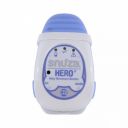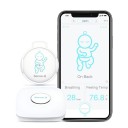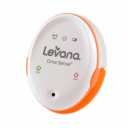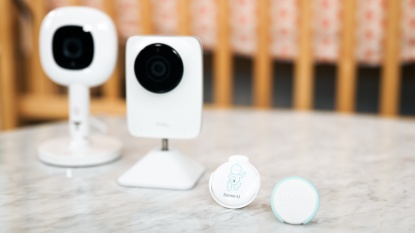Babysense 7 Review
The Skinny
Compare to Similar Products
 This Product
Babysense 7 | |||||
|---|---|---|---|---|---|
| Awards | |||||
| Price | $130 List $127.50 at Amazon | $138 List $129.99 at Amazon | $80 List | $200 List $199.99 at Amazon | $100 List $69.99 at Amazon |
Overall Score  |
|||||
| Star Rating | |||||
| Bottom Line | Easy to use mattress style sensors with 2 sensor pads but no parent unit or adjustability | Highly portable, clip-style wearable with vibration stimulates baby without upsetting loud alarm | With just a sensor and a smartphone required, this simple option has a shorter battery life but works relatively well | This simple wearable is easy to use and connects via WiFi, but it does have some false alarms and only pairs with one smart device | Portable wearable with vibration rousing and in-nursery alarm that is easy to use and often on sale |
| Rating Categories | Babysense 7 | Snuza Hero SE | Monbaby Smart Butto... | Sense-U Baby v3 | Levana Oma Sense |
| Expected Reliability (25%) | |||||
| Set-up (20%) | |||||
| Ease of Use (20%) | |||||
| Monitoring Cababilities (20%) | |||||
| Alerts (15%) | |||||
| Specs | Babysense 7 | Snuza Hero SE | Monbaby Smart Butto... | Sense-U Baby v3 | Levana Oma Sense |
| Sensor Type | Sensor Pad | Wearable | Wearable | Wearable | Wearable |
| Parent Unit | No | No | Smartphone | Smartphone | No |
| Monitoring Type | Movement | Movement | Movement, Position, Activity | Movement, Position, Activity | Movement |
| EMF (at baby) | 1.1 | No increase above ambient | 2.5 | 2.5 | .2 (lower than ambient) |
| Recommended Age | 0-12mo | Not Listed | Not Listed | roll-over alarm is for babies up to 6 months | 0-6mo |
| Adjustable Sensitivity | No | No | No | No | No |
| Wireless Mobility | Yes | Yes | Yes | Yes | Yes |
| Baby Alert | Yes | Yes | No | No | Yes |
| Warranty | 1 Year | 1 Year | 1 Year | 1 Year | 1 Year |
Our Analysis and Test Results
BabySense is a Hisense Ltd company. Hisense, founded in Isreal in 1991, is an award-winning medical device company that was the first to sell no-touch motion sensor technology in 1992. Hisense has subsidiaries and distributors in 35 countries, and BabySense monitors are used in hospitals and homes worldwide.
Performance Comparison
Expected Reliability
The Babysense 7 is a sensor pad or "non-contact" movement monitor with two sensor pads. Using two pads under the crib mattress can potentially cover the space of a standard crib, which could translate to fewer false alarms than monitors with only one pad. This issue is especially true once babies start to move, as they can roll or creep too far away for a single sensor to monitor them adequately. However, false alarms can still happen due to interference from anything in the baby's room that can cause vibrations, like heaters, mobiles, air filters, or noisemakers. As a result, parents should avoid placing these kinds of items near the crib.
The Babysense 7 earned one of the higher expected reliability ratings in the group. While it lacks a sensitivity adjustment to help weed out ambient vibrations that could result in poor functioning, using two sensor pads theoretically increases the unit's accuracy no matter where the baby is located on the mattress. We did not experience any false alarms during testing nor read of any in our research.
Set Up
Setting up the Babysense 7 requires placing the sensor pads under the mattress and assuring the cords are safely out of the baby's reach to prevent a strangulation hazard. This monitor requires a rigid surface under the mattress, and the company suggests a minimum of 3/8 inch plywood and a simple solution if your crib doesn't come with a hard surface. The BabySense comes with two sensor pads to place under the mattress and a nursery unit that clips to the crib side. The unit runs on 4AA batteries, so there is nothing to plug in or pose a safety risk for strangulation. The Nursery unit has an on/off button, and the unit faces outward so parents can see the alarm lights should they go off.
The Babysense 7 requires a rigid surface with a minimum of 3/8 inch thickness (like plywood or similar) for the sensors to rest on under the mattress. The monitor won't work with certain mattresses, including memory foam, thick straw, or hollow-core mattress types.
Ease of Use
This monitor is pretty straightforward, with a simple plug-and-play design that doesn't have awkward or confusing buttons or menus to mess with. It is also more manageable in the long run than a wearable because there is nothing to attach to a squirming baby. The only thing parents need to remember is to turn the monitor off before taking the baby from the bed and turn it on after they put the baby down to sleep to avoid false alarms.
The Babysense 7 is easier to transport than other mattress pad options as it doesn't need to be plugged in and has minimal wires. This monitor operates on 4 AA batteries that last 6-8 months under normal use, so you don't need electricity or a bulky charging station. While it has multiple parts, each part is on the small side and lightweight enough for easy transport. However, the BabySense needs a rigid surface under the mattress, often unavailable in hotels or travel cribs, so while it is easy to stow, it may not work with every sleeping surface you encounter on travel.
Monitoring Capabilities
The BabySense7 only monitors movement that indicates continued breathing. It does not have a parent unit or transmit sound or video. Several competitors that monitor movement indicative of breathing also include things like temperature or position monitoring.
Alerts
The alarm on this monitor is in-nursery and loud. While we didn't experience any false alarms, you want to turn the monitor off before you take your baby out of the crib to avoid startling alarm activity when the crib is empty. We also think parents should consider pairing this kind of monitor with a video or sound option to help ensure they can hear it from anywhere away from the nursery.
Electromagnetic Field (EMF)
During our tests for EMF, the Babysense 7 EMF (Volts/meter) reading was 1.1. This measurement is significantly lower than the other mattress pad sensor we tested. However, some of the wearables did not emit any EMF during testing. The amount you feel comfortable with is up to you, but the amount emitted by the Babysense was not excessive, in our opinion, compared to other products.
Should You Buy the Babysense 7?
If you are looking for a mattress pad sensor-style movement monitor, this is our choice. While it doesn't have the sound monitor ability of some of the competition nor the video capabilities, it is still a potential choice if you want a sensor pad-style monitor. This monitor is easy to set up, perfect to pair with a sound option, and has two sensor pads for better coverage and reliability.
What Other Movement Monitor Should You Consider?
A wearable monitor might be a better fit if you want something more portable or compatible with a wider variety of mattress types. The Snuza Hero SE attaches to the baby's diaper and makes an in-nursery alarm when they sense movement hasn't occurred in a set period. It also has a vibration-rousing feature to help avoid startling false alarms. If you want even more information, such as your baby's position or WiFi capabilities and an outside nursery alert, we like the Sense-U Baby v3. If you want all the monitoring functionality of a video, sound, and movement monitor, our favorite is the Nanit Pro Complete Set Monitoring System. While it has a significantly higher price than the competition, it does everything and can likely be the last monitor you need to buy.













